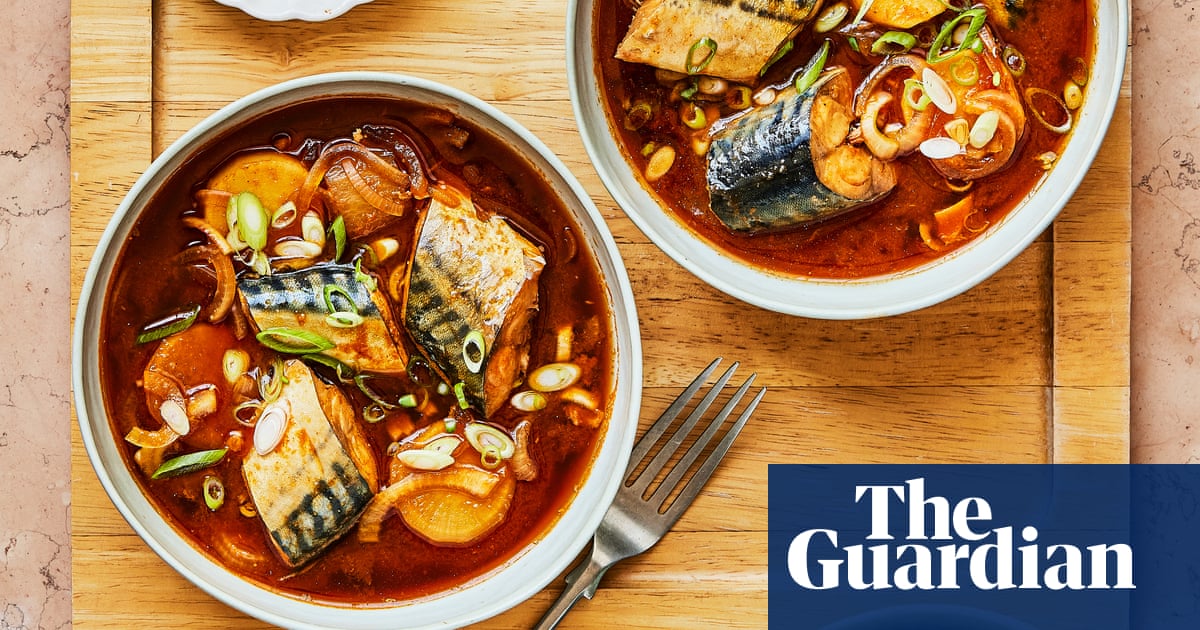When we first came across today’s main course, described in Chang Sun-Young’s classicA Korean Mother’s Cooking Notesas “hard-boiled mackerel”, we were as sceptical as we were intrigued. While the idea went against every fish-cooking mantra we knew, a large, fatty fish actually stands up rather well to a fairly long boil, and the process firms it up nicely, so you can pick up chunks of fish while leaving the bones (essential to give body and flavour to the broth) in the bowl. Our all-time favourite version of this dish was at the now defunct Jeju Hang restaurant in Seoul, where they served it with plump, broth-imbued half-moons of Korean radish and a condiment of fermented cutlass fish innards, as well as perfectly steamed rice. The salad, meanwhile, is a seasonal take on one of Jeju Hang’s side dishes (the original used seaweed instead of asparagus), and its mild, nutty, herbaceous flavour is the perfect foil to the sweet, spicy fish.
Source your mackerel carefully, because many UK fisheries are now so overfished as to be unconscionable – the ones we use are line-caught in the southwest, which is one of the UK’s few remaining sustainable mackerel fisheries; otherwise, use big fat herrings instead. Most large supermarkets sell gochujang (Korean fermented chilli paste) nowadays, while doenjang (Korean soybean paste) and gochugaru (Korean chilli powder) can both be found in any Asian supermarket (the doenjang can, at a pinch, be replaced with miso). As for the kelp, while it’s edible and very tasty, its main purpose is to impart umami to the broth and fish. Steamed rice is a non-negotiable alongside.
Prep20 minCook30 minServes4
For the seasoning sauce120g soy sauce120g mirin40g peeled garlic(about six or seven cloves), roughly chopped10g ginger, peeled and roughly chopped15g doenjang15g gochujang30g fish sauce15g gochugaru
For the fish1 mooli, peeled and cut into 2cm-thick rounds (about 500g)2 small onions, peeled and thinly sliced (about 250g)2 large sustainably-sourced mackerel, or herring, heads and guts removed, then cut across the bone into large chunks (800g-1kg net weight)10g kelp(kombu), or about ½ standard sheetA few finely sliced spring onions, to serveSteamed rice, to serve
First make the seasoning sauce. Put all the ingredients in a food processor and blitz smooth.
Lay the mooli rounds in a single layer in a wide, shallow saucepan, then layer the sliced onion, fish and seaweed on top. Pour the seasoning sauce over the whole lot, then add enough water just to cover the fish. Bring to a boil, then turn down the heat so the broth is at a lively simmer, and cook for 20-25 minutes, regularly basting the fish, until the fish is cooked through, the mooli is tender and the sauce is reduced.
Ladle into bowls, garnish with a handful of sliced spring onions and serve with steamed rice.
Prep10 minPress15-30 minCook20 minServes4
½ small block firm tofu(about 140g)50gpine nuts(about 3 tbsp), plus extra for serving1 garlic clove, peeled and roughly chopped1tsp readymade English mustard1tbsp rice vinegar1 tsp honey2 red dates, pitted and roughly chopped (optional but recommended)2-3 tbspdashibroth, or waterSalt andblack pepper2 bunches asparagus(English, ideally), woody stems removed (about 500g net)
Wrap the tofu in kitchen paper or muslin, put a heavy object on top (a can of beans will do) and leave for 15-30 minutes, to press out some of the moisture– the tofu needs to be very dry for this dish.
Toast the pine nuts in a dry frying pan, tossing them continuously, for three or four minutes, until nicely golden brown all over and the kitchen is filled with the intoxicating aroma of freshly roasted nuts. Tip the nuts into a mortar or food processor, then grind to a powder. Roughly chop or crumble the tofu, add it to the mortar or processor, then mash until smooth.
Add the garlic, mustard, vinegar, honey and red dates, if using, then pound or process again until smooth. Add just enough dashi (or water) to loosen the mix to a thick, creamy dressing, then season with salt and pepper to taste.
Cook the asparagus in a pan of salted boiling water for about three minutes, so the spears are cooked but still have some bite to them, then drain and refresh under cold water. Drain again and dry on a clean tea towel or kitchen paper.
Arrange the asparagus on a platter, spoon over the tofu dressing, and serve sprinkled with a few extra toasted pine nuts, if you like.
Kyu Jeong Jeon and Duncan Robertson are chefs/co-owners ofBokmanandDongnae, both in Bristol
